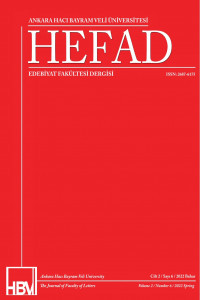Erken Cumhuriyet Döneminde Claude Farrère’in Gözünden Türkler
Toplumda değişimlerin ve yeniden yapılanmaların yaşandığı Erken Cumhuriyet Dönemi’nde, Batı ülkelerinden söylemleri, yazıları ve tavırları ile “Türk dostu” olarak anılan pek çok isimden bahsedilebilir. Bu isimlerden biri de Fransız yazar Claude Farrère’dir. Farrère, bir imparatorluğun çöküşünün çerçevesini çizen elli yıllık süre boyunca Türkiye'de seyahat edebilen tek Fransız yazardır ve hem eski imparatorluğa hem de yeni Türkiye’ye ve hızla farklılaşan iki dünyanın menteşesinde yer alan bir ulusun dirilişine tanıklık etmiştir. Farrère’e “kötü gün dostu” denmesini sağlayan etken, ülkeye kritik bir zaman diliminde gelmesi ve şahsi kabiliyetlerini ve derin dostluğunu Türkiye’nin çıkarlarına adamış olmasıdır. Bu anlamda Farrère’in Türkiye seyahatleri, burada geçirdiği süre boyunca yaptıkları, gözlemleri ve fikirleri önem taşımaktadır. Farrère’in Türkiye ve Türklere olan ilgisi Türkiye’ye yaptığı seyahatlerde kendini göstermekte, fikir ve izlenimleri ise eserlerinde ve demeçlerinde açığa çıkmaktadır. Bu çalışmanın amacı, Farrère’in Türkiye seyahatlerini, Türkiye ve Türkler hakkındaki fikirlerini ele almaktır. Çalışmanın kapsam ve sınırlılıkları doğrultusunda Farrère’in Türkiye ve Türkler ile kurduğu ilişkinin tarihsel ve coğrafi bir haritası çizilmeye çalışılmıştır. Farrère’in ilk kez 1902 yılında önyargılarla geldiği Türkiye’de kaldığı süre boyunca Türk halkını tanıyarak fikirlerinin değişimine odaklanılmış, beslediği dostane duyguların Türklere has “hoşgörü”, “yardımseverlik”, “gurur”, “cesaret” gibi özelliklerle açıkladığı gerekçeleri, eserlerinde yer bulan gündelik hayattaki yansımalarıyla ele alınmıştır. Kurtuluş mücadelesi sırasında Mustafa Kemal ile olan görüşmesine odaklanılmış ve edebî bir üslupla ele aldığı görüşmenin ayrıntıları irdelenmiştir. Gerek sivil olarak gerekse Fransız devletinin kendine verdiği yetkilerle Fransa-Türkiye arasında edindiği arabulucu konumun siyasi konjonktürde taşıdığı önemin altı çizilmiştir. Farrère bazı fikir ayrılıklarına düşse de her zaman Türklerin yanında olmuştur. Eserlerinde ve gazete yazılarında Türk halkının sesini duyurmuş, kimi siyasi kararlarda etki sahibi olmuş, o dönemin tarihsel bağlamı içinde önem taşıyan bir şahsiyettir. Son olarak, Farrère’in Türklere verdiği destek ve Türk kültürüne beslediği güzel duygular tarihe bir not olarak düşmüş ve ister öznel ister eleştirel bağlamda, yabancı bir yazarın gözünden kendimizi görme imkânını sağlamıştır.
Turks through the Lens of Claude Farrère in the Early Republican Period
In the Early Republican Period, in which changes and restructurings were experienced in society, several figures from the Western countries, who were referred to as "friendly towards the Turks" in terms of their discourses, writings and attitudes could be mentioned. One of these figures is the French writer Claude Farrère. He has been the only French writer to travel inside Türkiye during the fifty-year period that set the framework of the collapse of an empire. The writer also witnessed the old empire, the new Türkiye and the resurgence of a nation in the middle of two rapidly diverging worlds. The reason why Farrère is called “a friend in need” is that he came to the country at a critical time and devoted his personal talents and strong friendship to the interests of Türkiye. In this regard, Farrère's trips to Türkiye, his actions, observations and ideas during his time here hold significance. Farrère's interest in Türkiye and the Turks manifests itself in his visits to Türkiye, while his ideas and impressions about it are reflected in his works and statements. The aim of this study is to discuss Farrère's visits to Türkiye as well as his ideas about Türkiye and the Turks. In line with the scope and limitations of this study, a historical and geographical map of Farrère's relation with Türkiye and the Turks has been attempted to be drawn. The study focuses on the change in the writer’s ideas about Türkiye after getting to know Turkish people in person during his stay in Türkiye, even though he had had prejudices before he first visited in 1902. The article also discusses the reasons for his friendly feelings that he explains with the characteristics such as "tolerance", "helpfulness", "pride" and "courage", which are unique to Turks, by referring to the daily-life reflections in his works. Farrère’s meeting with Mustafa Kemal during the War of Independence, and the details of the conversation he discussed in a literary style have been another subject of focus. The importance of the writer’s mediator position between France and Türkiye in the political conjuncture both as a civilian and also with the authority given by the French state has been underlined. Even though Farrère had some disagreements, he always stood by the Turks. He is an invaluable figure in the historical context of that period, who made the voice of the Turkish people heard in his works and newspaper articles and had an influence on some political decisions. As a result, Farrère's support dedicated to the Turks and his good feelings for the Turkish culture have left a mark in history and provided us with the opportunity to subjectively and critically see ourselves through the lens of a foreign writer.
___
- Farrère, C. (1907). L'homme qui assassina. Paris: Ollendorff.
- Farrère, C. (1921). L'extraordinaire aventure d'Achmet Pacha Djémaleddine, pirate, amiral grande d'Espagne et marquis, avec six autres histoires singulieres. Paris: E. Flammarion.
- Farrère, C. (1922). Turquie ressuscitée, choses vues. (Les Ouvrages Libres). Paris: Arthème Fayard no: 18.
- Farrère, C. (1926). Mes voyages: au seuil des colonnes d'Hercule, la Mer des Corsaires, la Mer italienne, la Mer des Hellènes, Constantinople, en poursuivant la Toison d'or. En Méditerranée. Paris: Flammarion.
- Farrère, C. (1930). Turquie ressuscitée. Paris: Éditions des Cahiers Libres.
- Farrère, C. (1933). Les quatres dames d'Angora. Paris: E. Flammarion.
- Farrère, C. (1951). La dernière porte. Paris: E. Flammarion.
- Farrère, C. (1953). Souvenirs. Paris: Arthème Fayard.
- Farrére, C. (1964). Dirilen Türkiye. (F. Baldaş, Çev.)
- Özçelebi, A. (1974). Mustafa Kemal Atatürk ve Claude Farrere. 50. Yıl Armağanı, II, 50-65.
- Özçelebi, A. Claude Farrère et La Turquie. Doktora Tezi, Erzurum Üniversitesi, 1979.
- TTA, Kişisel Arşivlerde İstanbul Belleği Taha Toros Arşivi. Büyük Dostumuz Claude Farrere ile Mülakat. Erişim 13 Eylül 2022, https://9lib.net/document/oy8l855q-b%C3%BCy%C3%BCk-dostumuz-claude-farrere-ile-m%C3%BClakat.html
- TTA, Kişisel Arşivlerde İstanbul Belleği Taha Toros Arşivi. Claude Farrere. Erişim 13 Eylül 2022, https://9lib.net/document/myjp1mmy-claude-farrere.html?utm_source=search_v3
- TTA, Kişisel Arşivlerde İstanbul Belleği Taha Toros Arşivi. Türk Kadını ve Claude Farrère. Erişim 13 Eylül 2022, https://9lib.net/document/y960g17r-t%C3%BCrk-kad%C4%B1n%C4%B1-ve-claude-farrere.html?utm_source=search_v3
